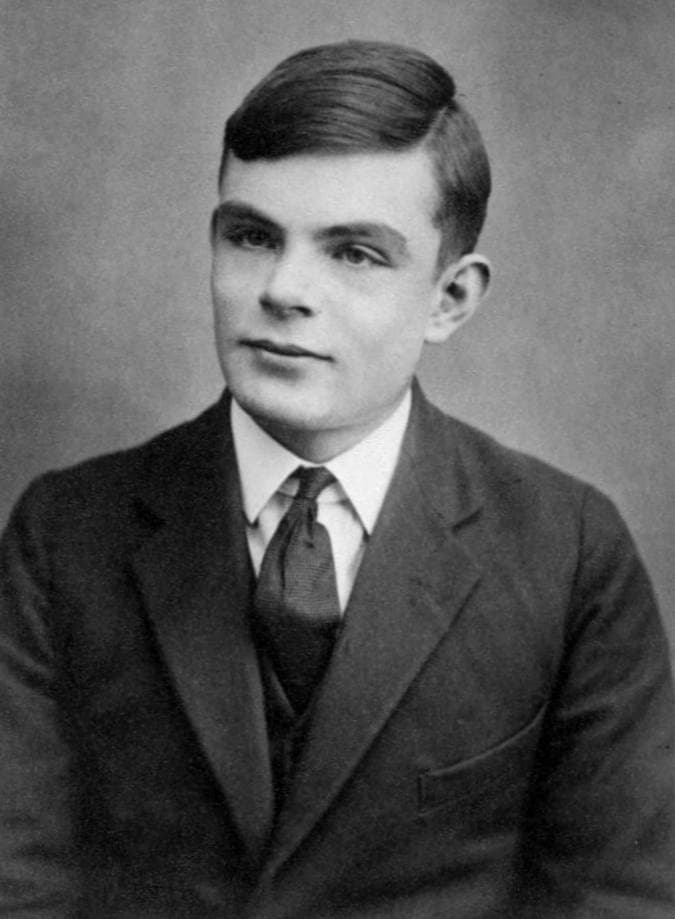 Alan Turing
2023-01-20
6 min read
Alan Turing
2023-01-20
6 min read
Who is Alan Turing, and What is He Most Famous For? The Father of AI
Alan Turing was a British scholar who is famously called the father of Artificial Intelligence (AI). He rightly earned this eponym because of his work in that space. Turing is also responsible for several notable breakthroughs in mathematics, philosophy, and other sciences. Much of his work directly led to the birth of new science-related fields such as cryptanalysis and cognitive science.
Historians tout Turing as the most influential figure in developing core concepts like algorithm development and advanced computation. His Turing machine, which closely resembles the general-purpose computer, is the underpinning technology. Due to his influence and power, he is credited with several awards while alive and posthumously. King George VI awarded him an Order of the British Empire (OBE). He got his OBE appointment because of his work done during the war. However, a lot of his accomplishment during this time was a secret.
Early Life
Alan was born in Maida Vale to Julius Mathison Turing and Ethel Sara Turing (nee Stoney). Alan Turing’s father, Julius, worked with the Indian Civil Service, and he had to take time off work to have his son in Britain. Hence, they moved to Maida Vale. A few years later, his parents bought another house in West Surrey, where Alan spent most of his vacations.
From a tender age, he displayed the tendencies of a precocious kid. The headmistress of his elementary school mentioned Alan’s genius, separating him from the other boys. He also had an affinity for learning, especially math and sciences. Unfortunately, on the first day of school at Sherborne School, there was a general strike in Britain. This strike made transportation a hassle, but young Turing would not be deterred. He rode his bike alone for 60 miles, almost 100 km, just to get to school. Even though he loved learning, his teachers at Sherborne were not impressed with Turing’s aptitude. The school focused on philosophy and languages, and Turing preferred mathematics and science. He grasped the work of Einstein and Newton easily at the tender age of 16.
Turing and Morcom
Turing encountered Christopher Morcom at Sherborne, and they instantly bonded! Several accounts describe Morcom as Alan’s first love. Their relationship gave Turing inspiration for a lot of work he went on to publish. Unfortunately, Morcom died of bovine tuberculosis in 1930. Despite the death of his close friend, he continued to write to Morcom’s mother, sending gifts and words of consolation.
Alan Turing at University and His Scientific Works
It’s not surprising that Alan Turing went on to King’s College in Cambridge and bagged the highest honors attainable at the age of 22. Shortly after, he published his paper proposing that his “universal computing machine could do any mathematical computation”. This machine is what we now know today as the Turing machine. During this time, Alonzo Church also published a paper on equivalent proof. Alonzo published his paper before Turing’s, and it used lambda calculus instead. However, Turing’s approach was said to be more intuitive.
The Turing Machine in Simple Terms
Simply put, the Turing machine is a computational model that describes an algorithm-solving machine. So what makes the Turing machine so revolutionary? It’s the fact that Alan Turing was able to prove that any computable problem could be solved using this machine. The machine came to light in 1936, and he called it an a-machine. A, in this case, stands for automatic.
What was Alan Turing’s IQ?
Alan Turing was no doubt intelligent. In fact, some say he’s a genius. Several reports claim he had an IQ of 185. However, he was not your typical genius. Turing’s grades at Sherborne show signs of a typical teenager who was not so enthused to learn languages. However, he always loved math and science.
Was Alan Turing autistic? People ask due to his portrayal in the movie; The Imitation Game. However, there’s no concrete evidence to back this. Indeed, he was often ostracised because of his social ineptitude and aloofness. However, this claim is not backed by science. Also, there was no diagnosis of Autism when he was alive.
Professional Life
Alan Turing spent significant time working on cryptanalysis during world war two. He successfully used advanced statistical techniques to improve the British government’s ability to break codes used by other countries. His main focus was on the Enigma cipher machine. Enigma was Nazi Germany’s main method of communication. He even published two papers on this. He also identified a bombe, an Enigma-breaking electromechanical machine.
After working on machines to decipher messages, he moved to the US to work with Bell Labs on an electronic enciphering technique. He eventually moved back to London to work on designing the first computing engine. He also turned his focus to mathematical biology, publishing his work on Morphogenesis.
Was Alan Turing Married?
Although Turing proposed to marry his then-girlfriend and co-worker at Hut 8, their engagement abruptly ended. He decided against the marriage after he admitted to Joan Clarke that he was gay. According to reports, Turing’s homosexual status was not surprising to his fiancee, Joan.
Eleven years after the called-off engagement, Turing began a relationship with 19-year-old Arnold Murray. Turing was 39 at the time. An incident happened at the time, which led to an investigation, and it was during this time Turing acknowledged sexual relations with Murray. Homosexuality was a criminal offense in the UK at this time, and Turing was charged with “gross indecency”.
Alan Turing- the Imitation Game
Another popular question we often get is, “Is the Alan Turing Movie Real?” We would like to acknowledge the fantastic job done by the protagonist in the movie. However, like many adapted movies, the Imitation game has a lot of historical fallacies. The movie depicts the life and times of Alan Turing. However, the portrayal of Turing is not entirely correct.
For instance, the character in the movie tells another character that he does not understand German. However, Alan studied German and traveled to Germany before WWII. Turing was also portrayed as irrational and eccentric, although many colleagues recall him being quite the opposite- a very easily approachable man. There are also several documentaries on Alan Turing that shed more light on his works and knowledge.
How did Alan Turing Die?
On 8 June 1954, Turing was found dead. His housekeeper found him in Wilmslow with a half-eaten apple on his bedside. It was eventually established that his death resulted from cyanide poisoning. An official inquest proved that he died from suicide. However, there are several speculations about his death.

